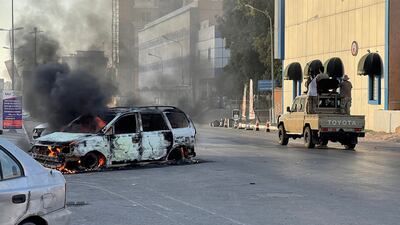Libya’s rival governments have sought to avoid blame for bloody clashes in the capital Tripoli that brought the country’s political crisis to a fresh nadir.
The fighting that broke out on Saturday pitted militias loyal to the Tripoli-based government led by Abdul Hamid Dbeibah against armed groups allied with the government of Fathi Bashagha, which is based in the central city of Sirte. At least 32 people were killed and 159 wounded.
The armed groups set buildings on fire and spread panic across the streets of the capital, which has witnessed sporadic clashes in recent months.
Mr Dbeibah and Mr Bashagha held each other responsible for the violence in messages released after the fighting subsided on Sunday.
“Elections are the only solution to the political crisis in Libya,” Mr Dbeibah said in a statement posted on his Facebook page.
“I want to reassure you [the Libyan people] that the aggression is over. The dream of elections is approaching. And I would like to tell them [the Bashagha camp] the Libyans have rejected to extend the rule of your government, which has lost its legitimacy.”
The violence took place despite the meetings held last month in Tripoli by senior military figures from Libya's eastern and western power bases in a bid to unify command over militias and troops, as well as to discuss the issue of mercenaries and foreign fighters.
Mr Dbeibah's government was installed last year through a UN-backed process, with the task of leading the country to the first presidential election in Libya’s history. The poll was scheduled for December but was not held amid disputes over election laws and controversial candidates.
Parliament appointed the government led by Mr Bashagha earlier this year, saying the mandate for Mr Dbeibah's government had expired.
Mr Bashagha laid the blame for the weekend's violence with the Tripoli camp, adding that Mr Dbeibah ticked all the boxes of a dictatorship.
“The so-called Abdul Hamid Dbeibah and his special advisers from members of his ruling family and armed gangs with him are responsible for the bloodshed,” he said in a statement published by Libya media outlets supporting his government.
“What happened was the result of their obsession with money and power. They are clinging to the office despite the people’s will and rejected the principle of peaceful transfer of power.”
In a move that could provoke a full-blown conflict, the military prosecutor of the Dbeibah government, Massoud Rahouma Muftah, placed a travel ban on Mr Bashagha and ordered his arrest along with his military and civilian aides over the violence in Tripoli.
Mr Bashagha’s supporters dismissed the orders as impractical and called the military prosecutor in Tripoli “worthless”.
The resurgence of fighting in the capital comes as living conditions deteriorate for ordinary Libyans, mainly because of fuel shortages in the oil-rich nation caused by recurring shutdowns of oil facilities by militias backed by tribal leaders.



















